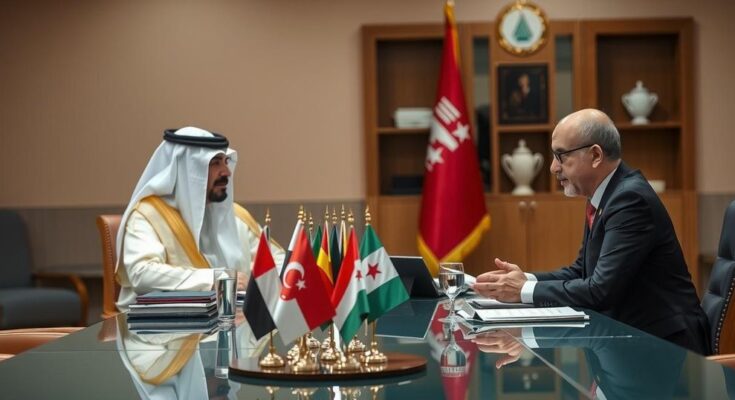Qatar and Jordan have pledged support for Syria, focusing on investments in energy and aid for reconstruction following the recent leadership shift. Syrian leader Ahmed al-Sharaa is actively seeking to build diplomatic ties, while Jordan emphasizes security cooperation due to mutual concerns over smuggling and terrorism. These developments indicate a significant shift in Middle Eastern geopolitics amidst the vacuum left by Assad’s fall.
In a significant diplomatic engagement, Qatar and Jordan have voiced their commitment to support Syria following the recent changes in its leadership. During meetings held in Damascus, Syrian de facto leader Ahmed al-Sharaa expressed Qatar’s intent to invest in various sectors, particularly energy, ports, and airports. Furthermore, Jordanian Foreign Minister Ayman al-Safadi stated Jordan’s readiness to assist in Syria’s reconstruction, reflecting a growing trend of Arab states extending their cooperation with Syria after the fall of Bashar al-Assad.
Al-Sharaa’s meetings mark a vital phase in the Syrian political landscape, as he seeks to bolster international ties amidst the power vacuum left by Assad’s departure. Qatar’s Minister of State for Foreign Affairs, Mohammed Al-Khulaifi, emphasized Qatar’s readiness to support Syria during this critical juncture, mentioning the necessity of lifting sanctions and fostering developmental initiatives. Meanwhile, Jordan has underscored mutual security concerns, particularly regarding smuggling activities, while affirming its commitment to provide aid.
This new alignment of Arab states towards Syria indicates a shift in regional geopolitics, particularly in neutralizing threats such as the Islamic State. Al-Sharaa’s current focus remains on reconstruction and economic recovery, with hopes of attracting broader international collaboration. The evolution of Syria’s relationships with its neighbors could redefine the stability of the Middle East.
Syria has been embroiled in a protracted civil war for over thirteen years, mainly against the regime of Bashar al-Assad. The recent shift in power following the overthrow of Assad has opened doors for renewed diplomatic relations between Syria and other Arab nations. Qatar’s interest in investing in Syria highlights a potential economic revival in the region. Jordan, sharing a border with Syria, is particularly focused on security cooperation and economic redevelopment, given the recent changes in the leadership dynamics of Syria. This development reflects a broader trend among Arab states to stabilize ties with Syria in light of shifting geopolitical conditions, following years of isolated relations due to Assad’s regime.
The pledges of support from Qatar and Jordan signal a pivotal moment in Syria’s post-Assad political period. With Qatar poised to invest significantly in key sectors and Jordan emphasizing reconstruction efforts, these actions may lead to enhanced stability and development in Syria. The collaborative approach among these nations underscores an important shift in regional geopolitics, where collective security and economic progress are paramount for future peace in the Middle East.
Original Source: www.channelnewsasia.com




